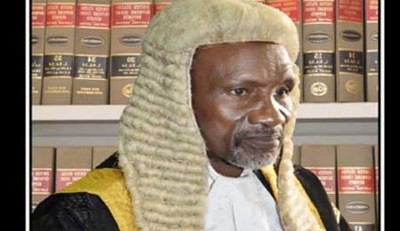Just as they rejoice whenever a high-profile person is arrested for alleged corruption, many Nigerians were elated Saturday morning when news of the arrest of several judges from different parts of the country broke. Among those arrested were two Supreme Court justices. Initially, it was reported that the name of one had been pencilled in as the next chief justice of Nigeria, but it’s not so. The home of the next CJN, Walter Onnoghen, was not raided.
Rivers State governor Nyesom Wike, a lawyer himself, had moved to prevent the “abduction” of a judge in Port Harcourt at unholy hours. Operatives of the Department of State Services, DSS, the secret police that carried out the raids, threatened to shoot him, the governor said.
This is one fight the Buhari administration must not leave halfway; otherwise, it would be like hitting a snake and not killing it. The number of corrupt judges far exceeds the number of incorruptible ones. Thus, judges indicted for corruption may receive sympathy from their colleagues, when their trials start. The DSS could have picked up just a few it had gathered evidence against.
It’s good the cleansing has begun. It should not end until all alleged looters of the public treasury have had their days in court also. Naming and shaming corrupt people is always a step in the right direction.
The DSS did just that on Saturday afternoon. Addressing a press conference at the DSS headquarters to explain why it carried out the raids, an official of the service, Mallam Abdullahi Garba, said it recovered the equivalent of almost N300million in various currencies from the residences of three judges alone: N93, 558, 000; $530,087; £25,970 and €5,680.
The raids were aimed at restoring “sanity and sanctity” to the judiciary in Nigeria, he stated, and not meant to rubbish it. A planned raid on the residence of a judge in Rivers State was frustrated by Governor Wike who brought in thugs to prevent the service from carrying out its mission in connivance with an unnamed sister security agency, Garba said. The service, he said, had intelligence that the Port Harcourt judge had $2million cash at home.
The DSS explained that the operations were based on allegations of corruption and other acts of professional misconduct by the suspected judges, and that the action of the service was in line with its core mandate. The affected judge’s “expensive and luxurious” lifestyle was being monitored by the service, Garba said, adding that some of the arrested suspects had made useful statements while others were still in denial despite glaring evidences.
The sting operation of October 8 was just the beginning of efforts to cleanse the Nigerian judiciary. Likely, there will be further raids. Corrupt judges may now be deterred by the clampdown of October 8 and avoid desecrating the temple of justice.
The current CJN, Mahmud Mohammed, will retire from service in a few weeks. Mohammed, who succeeded Mrs Alooma Mukhtar barely two years ago, will be 70 on November 10.











